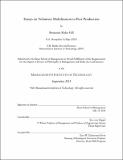| dc.contributor.advisor | Eric von Hippel. | en_US |
| dc.contributor.author | Hill, Benjamin Mako, 1980- | en_US |
| dc.contributor.other | Sloan School of Management. | en_US |
| dc.date.accessioned | 2014-04-25T15:19:49Z | |
| dc.date.available | 2014-04-25T15:19:49Z | |
| dc.date.copyright | 2013 | en_US |
| dc.date.issued | 2013 | en_US |
| dc.identifier.uri | http://hdl.handle.net/1721.1/86240 | |
| dc.description | Thesis: Ph. D., Massachusetts Institute of Technology, Sloan School of Management, 2013. | en_US |
| dc.description | This electronic version was submitted by the student author. The certified thesis is available in the Institute Archives and Special Collections. | en_US |
| dc.description | Cataloged from student-submitted PDF version of thesis. | en_US |
| dc.description | Includes bibliographical references (pages 93-102). | en_US |
| dc.description.abstract | Although some examples of Internet-based collaborative "peer production" -- like Wikipedia and Linux -- build large volunteer communities and high-quality information goods, the vast majority of attempts at peer production never even attract a second contributor. This dissertation is composed of three essays that describe and test theories on the sources and effects of volunteer mobilization in peer production. The first essay is a qualitative analysis of seven attempts to create English-language online collaborative encyclopedia projects started before January 2001, when Wikipedia was launched. Analyzing data from interviews of these Wikipedia-like projects' initiators, along with extensive archival data, I offer a set of three propositions for why Wikipedia, similar to previous efforts and a relatively late entrant, attracted a community of hundreds of thousands while the other projects did not. In the second essay, I use data from the Scratch online community -- a large website where young people openly share and remix animations and games -- to present evidence of a trade-off between "generativity" (i.e., qualities of work products likely to attract follow-on contributors) and the originality of the derivative work products that follow. In the third essay, I consider the relationship between volunteer mobilization and governance in peer production organizations. Although large successful peer production projects have inspired scholars and social movements, I use longitudinal data of internal processes drawn from a population of wikis to show that, like other democratic organizations, peer production projects exhibit governance consistent with Robert Michels' "Iron Law of Oligarchy." | en_US |
| dc.description.statementofresponsibility | by Benjamin Mako Hill. | en_US |
| dc.format.extent | 111 pages | en_US |
| dc.language.iso | eng | en_US |
| dc.publisher | Massachusetts Institute of Technology | en_US |
| dc.rights | M.I.T. theses are protected by copyright. They may be viewed from this source for any purpose, but reproduction or distribution in any format is prohibited without written permission. See provided URL for inquiries about permission. | en_US |
| dc.rights.uri | http://dspace.mit.edu/handle/1721.1/7582 | en_US |
| dc.subject | Sloan School of Management. | en_US |
| dc.title | Essays on volunteer mobilization in peer production | en_US |
| dc.type | Thesis | en_US |
| dc.description.degree | Ph. D. | en_US |
| dc.contributor.department | Sloan School of Management | |
| dc.identifier.oclc | 874134737 | en_US |
